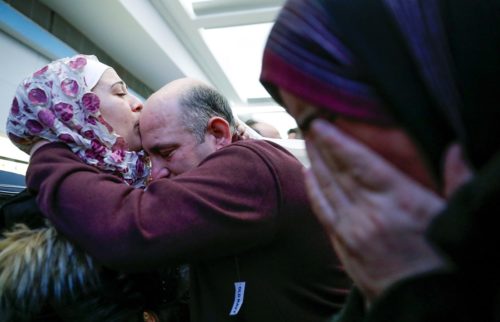Episcopal officials defend refugee resettlement after report Trump officials suggest halt to programPosted Jul 19, 2019 |
|

Syrian refugee Ahmad al Aboud and his family members, on their way to be resettled in the United States as part of a refugee admissions program, walk to board their plane in Amman, Jordan, in 2016. Photo: Reuters
[Episcopal News Service] Trump administration officials reportedly have discussed the option of reducing refugee resettlement to zero in the next federal fiscal year, a move that critics warn could devastate the long-term resettlement capabilities of Episcopal Migration Ministries and the eight other agencies with federal contracts to do that work.
A final decision on resettlement numbers isn’t expected until September – the fiscal year starts in October – but Politico’s July 18 report on the administration’s discussions prompted Episcopal Church officials to affirm the church’s support for the resettlement program and warn against halting it.
“Welcoming the stranger is a core tenet of our faith. Episcopalians around the country in our churches and faith communities stand ready to welcome and embrace refugees,” said the Rev. Charles Robertson, canon to the Presiding Bishop for ministry beyond The Episcopal Church.
His quote was released as part of a statement from Episcopal Migration Ministries, or EMM, that urged the Trump administration to return refugee resettlement numbers to historical norms after the sharp cuts of recent years. The ceiling for refugee resettlement was lowered to just 30,000 this year, down from 85,000 before President Donald Trump took office in 2017.
Reducing the ceiling to zero would parallel other policy moves the Trump administration has made to curtail both legal and illegal immigration, after candidate Trump made a hardline approach to immigration a cornerstone of his winning election bid. This week, his administration announced restrictions on protections for asylum-seekers that would turn away most of those who arrive at the U.S.-Mexico border seeking asylum. That plan faces legal challenges.
“In light of the recent asylum restrictions, these reports of the administration admitting zero refugees next year are extremely concerning and indicate an attempt to curtail any humanitarian pathways to protection,” Lacy Broemel, policy adviser for The Episcopal Church’s Office of Government Relations, told Episcopal News Service in an email. “It’s critical that Episcopalians speak out to their members of Congress to oppose such policies.”
Office of Government Relations has an advocacy page on its website devoted to the refugee resettlement program, and it issued a statement of concern this week in response to the asylum restrictions.
The Politico report is just the latest development to add to the ongoing uncertainty that Episcopal Migration Ministries and other refugee resettlement agencies face in the Trump era. It wasn’t clear until late last fall that all of those agencies’ contracts would be renewed for this year to help the State Department resettle refugees fleeing war, persecution and other hardships in their home countries.

Syrian refugee Baraa Haj Khalaf, left, kisses her father, Khaled, as her mother, Fattoum, cries after arriving at O’Hare International Airport in Chicago, Illinois, in February 2017. Photo: Reuters
EMM has resettled more than 95,000 refugees since the 1980s, providing a range of services for these families upon their arrival in the United States, including English language and cultural orientation classes, employment services, school enrollment and initial assistance with housing and transportation.
The agency finally received word on Nov. 30, 2018, that the State Department would renew its contracts with all nine agencies, but with the ceiling down to just 30,000 for the year, much of that work already had been reduced. EMM once oversaw 31 resettlement affiliates in 26 dioceses, but now that number is down to 13 affiliates in 11 dioceses.
At a meeting of federal security officials last week, a representative from U.S. Citizenship and Immigration Services suggested lowering the cap to zero, Politico reported, citing unnamed sources who were familiar with that plan. The immigration official, and a second official from the State Department, reportedly argued such a plan was justified by refugee security concerns, adding that protections still would be available through the asylum process.
Homeland Security officials raised the possibility of lowering the cap to 10,000 or as low as 3,000, Politico reported, effectively maintaining only the barest of resettlement programs. An official with Church World Service, one of the nine resettlement agencies, told Politico that such cuts would have long-term negative effects.
“It would mean that the capacity and the ability of the United States to resettle refugees would be completely decimated,” said Jen Smyers, a Church World Service director.
The Department of Defense, in the past, has defended the resettlement program, citing the example of Iraqi refugees who were resettled in the United States after assisting the American military in Iraq. Politico reported former Defense Secretary Jim Mattis had advocated keeping the ceiling at 45,000 refugees.
Presiding Bishop Michael Curry has been vocal in recent months supporting refugees and compassionate immigration policies. He issued a plea to “welcome the stranger” in a video released in June for World Refugee Day, and this week, he released another video message referencing Christian teachings and scripture in lamenting the humanitarian crisis on the United States’ southern border.
Curry, in Panama for Evento de Jóvenes Episcopales, told ENS on July 19 that he hoped the Politico report was not true.
“But if it’s true, it’s wrong,” Curry said, invoking the symbol of the Statue of Liberty to counter anti-refugee sentiments. “We can be better than this. I know that we can be better than this. We have been, and we must find a way. … America must become America again.”
– David Paulsen is an editor and reporter for the Episcopal News Service. He can be reached at dpaulsen@episcopalchurch.org. Managing editor Lynette Wilson contributed to this report.

Social Menu